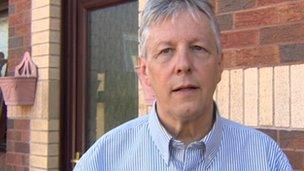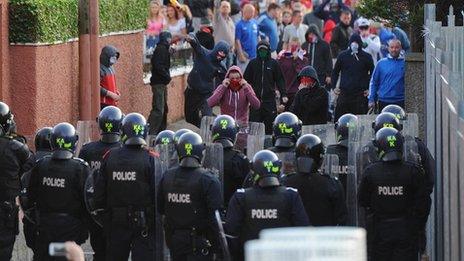Belfast rioting: First Minister calls for end to violence
- Published
A police officer hit in the face by a petrol bomb in north Belfast escaped with minor injuries after a colleague immediately extinguished the flames. BBC NI's Mark Simpson watched it happen.
Northern Ireland's First Minister Peter Robinson has appealed for an end to violence following two nights of rioting in north Belfast.
Almost 40 police officers and an MP were injured after being attacked. More than 30 arrests have been made.
A number of people have been appearing at a special court sitting in Belfast.
Mr Robinson said people needed to heed the Orange Order's call for the suspension of widespread demonstrations over restrictions on a 12 July parade.
"It's very important that this violence stops," he said.

First Minister Peter Robinson has called for an end to the violence
"It's very important that cool heads prevail in these circumstances and I hope people will obey the announcement and statement by the Orange Institution that people should desist from violence.
"The only kind of protest that is ever justifiable is a lawful and peaceful protest."
Mr Robinson said it "does no good" if people "simply sit back and allow this to happen time after time".
Northern Ireland Secretary Theresa Villiers said the Orange leadership should reflect on its role in the run-up to the Twelfth.
"They have emphasised that they wanted their protest to be peaceful," she said.
"But they were warned by the chief constable that encouraging thousands of people onto the streets at a time of real tension involved significant risks."
She had earlier described the two nights of violence as "shameful".
On Saturday night, officers were attacked with petrol bombs, fireworks, laser pens and stones in the Woodvale area. Police fired 10 baton rounds and deployed water cannon.
Police said trouble broke out shortly after 20:30 BST and continued for several hours. Calm was restored to the area at about 01:30 on Sunday.
Northern Ireland Justice Minister David Ford warned rioters they "will be brought to justice quickly and face the full rigours of the law".
"My message is clear, do not get involved in rioting on our streets, but if you choose to do so, then be prepared to face the courts within hours," he said.
Chris Buckler reports from the scene of Saturday's clashes
Another 400 police officers have been brought in from England and Scotland to aid the Police Service of Northern Ireland.
BBC Northern Ireland reporter Mark Simpson said a police officer was hit by a petrol bomb during the rioting on Saturday. The officer's colleagues quickly extinguished the flames.
The BBC's Andy Martin, in Belfast, said the rioting was "nowhere near as bad" as on Friday night.
On Saturday, Chief Constable Matt Baggott described the 12 July trouble as "shameful and disgraceful".
Clashes developed when police enforced a ban on an Orange Order march on Friday.
The order had called for widespread demonstrations after marchers were banned from a stretch of road separating loyalists and nationalists. It later said it was suspending its protest.

The police came under attack in north Belfast
The marching season in Northern Ireland is a period of events from April to August, with the highpoint on 12 July when Orangemen march to commemorate William of Orange's victory over the Catholic King James II at the Battle of the Boyne in Ireland in 1690.
William III is revered by the order as a champion of his faith. The Orange Order commemorate his victory in their annual parades.
Many Catholics see the marches as triumphalist and sectarian with some traditional Orange routes passing through or past areas occupied mainly by Catholics and nationalists.
The Parades Commission ruling on the north Belfast parade was welcomed by nationalist politicians but angered unionists.
- Published14 July 2013
- Published13 July 2013
- Published13 July 2013
- Published13 July 2013
- Published13 July 2013
- Published13 July 2013
- Published12 July 2013
- Published11 July 2013
- Published9 July 2013